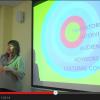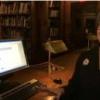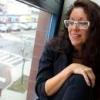Themes: Race & Ethnicity
Decentering Authority: CBBG - A Collaborative Oral History Project
Ricardo Osmondo Francis
"I think for a lot of people, being black, and even being a man can be very difficult. But I chose not to have that as an issue. And I think that I’ve survived life better by not allowing that to be an issue. I don’t want to be bitter, and I don’t want to be angry."
Caroline Fermin
“When we did the census a few times, she would be on the phone with them and they’d be like, 'Well, whatever language you speak at home is what race you are.' My mom would be furious. Having to choose I felt like was the hardest part."
Pete Beveridge
"By the time I was at Columbia, the FBI had become interested in my activities. When I finally got my FBI file, one of the entries was something to the effect of “He is known to make frequent trips to Harlem to associate with Negro people.” This was considered something worth noting in my FBI file."
Yasmin Dwedar
"When you have to wake up every single day and hear about how your people are violent extremists, terrorists, and people just saying all these racist Islamophobic things, even the tiniest thing can get you emotional because you have to hear it every single day."
Jasmine Mitchell
"I was already dating my husband, and my friend kept on trying to set me up with this guy. He's actually a very nice guy. He'd be great for someone else. But what she kept on talking about, “He's also biracial, Jasmine. He's also black and he's also white. You guys should date.” I was like, “I already am seeing someone.” She's like, “But I think you guys are really good.” It was like that was the key."
June Kaplan
"My father was one of 12, only four of whom actually came through the war. The rest were either killed in Germany — I don’t know how many of them were interned in camps. There’s a hole in the knowledge that we have about the Feigenheimer side of the family. And one of the things I’m going to do when I’m retired is go back and patch together what happened to the other 11 brothers and sisters."
Neela Wickremesinghe
“I like being able to identify as a New Yorker, because I feel like it covers more bases than saying “Well, you know, I’m Sri Lankan, but I’m Italian, but I’m Italian-American, and my grandmother’s Dutch, and colonialization has a lot to do with that,” but a New Yorker, I feel like it’s easier.
Paul and Yurika Golin
"Right before my bar mitzvah, when I was hating the studying, I was 12, and I already knew that I was, at the least, agnostic -- I kind of yelled at her, “I don’t want to do this. I don’t believe in God.” And she said, “Well, I don’t either, and you’re going to do it.” And it was really interesting to me because at that point and for the rest of her career she had already dedicated herself to working as a Jewish communal professional in the Jewish Community Centers movement.
Yasmin Nagi
"My cousin lives in Colorado, and she plays soccer. She wears a hijab. This year was her first game. It was a pretty big deal. And the referee didn’t let her play because of the hijab. She was pretty hurt, but her teammates were great enough to post up a picture of all of them wearing hijab, in support for Samah. And the picture really went viral. That day, they all did play with the hijab on.
Janise Mitchell
"Around the late 60s and 70s all of the sudden you see a lot of “for sale” signs. And this was the period of “white flight.” Families that I knew all of the sudden, oh, you guys are moving? It really shattered a sense of security. I thought that we were all friends, but perhaps that was just from my lens. Maybe that’s what I was hoping but the reality — there was some underlying intention that I did not allow myself to become aware of."
Taneka Maxwell
"We came to Brownsville, Brooklyn. My great grandmother owned a brownstone out there. Her name was Lillian but everyone called her Nanny. She was the matriarch of the family, well known throughout the neighborhood and the house was definitely multigenerational and just different family relationships. We had aunts and uncles and cousins living in a three story brownstone."
Neela Miller
"I was the only vegetarian kid in my school, and there was a trip, sixth grade, where it was an overnight trip and it was this big thing and we would all go to the woods, Stokes Forest in New Jersey, and it was a few days long. And I had to ask for special meals, and so they cooked me this special thing and it was always way better than everybody else’s food. And everybody would be eyeing my plate."
Shameeka Mattis
"It just felt like every time I came to Brooklyn… it was always 100 new white people on the train, 50 new white people, and I’m like “This is different.” Because racially Brooklyn was the black borough in so many different parts… So feeling that difference, at first I was just in shock and then I was angry because I knew that that meant that the property values were going to go up and… that the faces that would represent mine wouldn’t necessarily be there.”
Sebastien Fargeat and Vanessa Snowden
"When I got into Princeton, suddenly everyone who thought it was cool that I was from Venezuela attributed the fact that I got in there to the fact that I was Hispanic. And so that became really difficult for me, because I thought I had earned it, and suddenly, all these kind of weird feelings start coming up around my heritage, because I only got where I was getting to because of this, according to my peers.
Janet Pinkowitz
"I never wanted my mother to wear her, her Chinese dresses, which, of course, were really beautiful... I wanted her to wear something like an American shirtwaist dress, that kind of thing. That was something I regretted later, that I didn’t embrace more of that part of my heritage. Because it was just trouble for me, feeling and looking different. I just wanted to look like everybody else".
Whitley Watson
"It gets really, really frustrating, because people do think people from the south are all just like redneck crazy racists, and they think that you come up here and are in this paradise of stuff, and it’s like no, people are still -- there’s a lot of problems up here."
Joseph Figueroa
"I like to lead by example. Sometimes I don't like to lecture people. Even though I want to, but a lot of times I just lead by example, like you do what you do, I do what I do, just live life."




